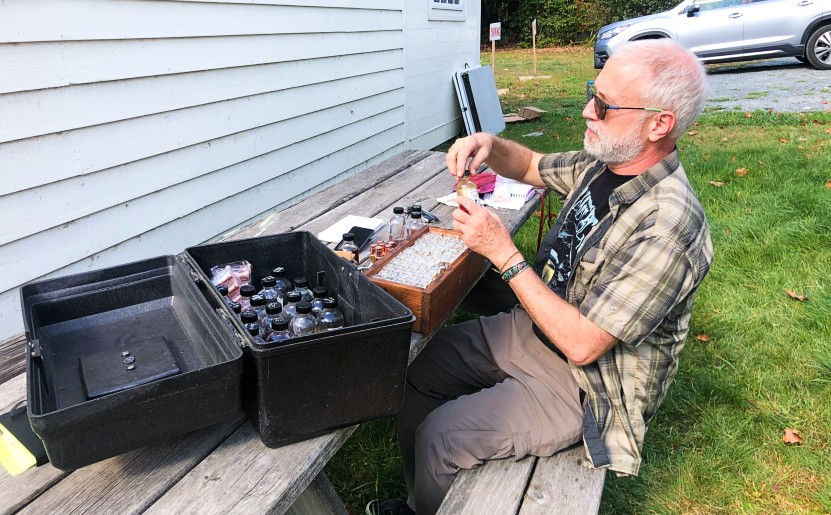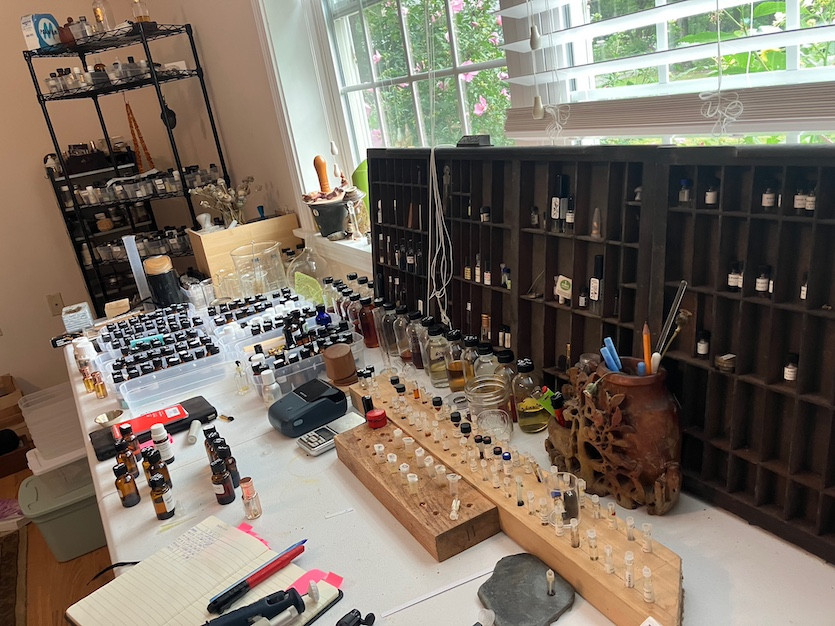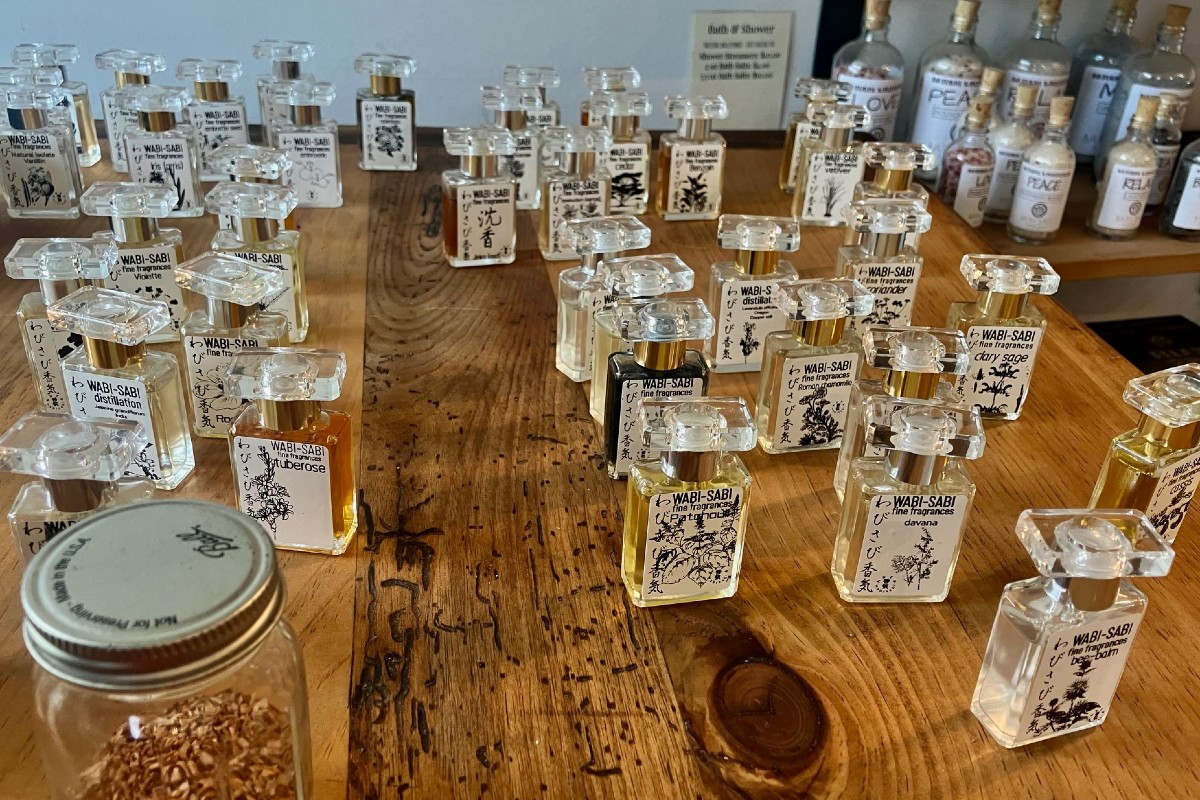Marco Puccio Blends Chemistry, Art, And Romance In WabiSabiKuoKi Perfumes
The former botanist has studied perfumery for decades, and is now formulating his own fragrances from all natural materials.

The former botanist has studied perfumery for decades, and is now formulating his own fragrances from all natural materials.

Photos courtesy Marcangelo Puccio
Engaging in a conversation about fragrance with Marcangelo Puccio opens a door to a scentified, layered, complex, world-encompassing universe of extracts and distillations. While a botanist with a long career in education in California, he spent three decades studying perfumery as avocation. Now retired and living in Columbia County, he is formulating fragrances to sell, with a growing line of scents under the name WabiSabiKouki.
Puccio, who says that he falls somewhere between a hobbyist and a professional perfumer, is passionate about using only natural raw materials. He sources them from around the world but also grows or forages locally for wild materials to create all-natural fragrances — and to make them affordable. “For me,” he says, “the process of sourcing, collecting and supplying very fine raw materials is every bit as intriguing as developing new fragrances.”
Puccio may call himself part hobbyist, but he’s been writing online about fragrance materials for 20 years, and his engagement with online creative communities has afforded him some reputation as a "nose.” He frequently receives samples of fragrance ingredients to review — a nice perk in his line of study, since these top-shelf oils and extracts from every part of the globe are often rare and extremely costly.
“The only things I’m using are products extracted from plants in some way,” Puccio says. That includes grain alcohol, essential oils, and natural isolates — purified chemicals extracted from a mixture. For those of us without a background in chemistry and botany, the science gets complicated. There’s talk of molecules and fermentation, distillates and evaporation. One can imagine him at his workbench, micropipette in hand, zealously layering, weighing and sniffing, adding one ingredient, trying again with a different blend. It’s alchemy — a mix of chemistry and art, with more than a dash of romantic imagery in a fragrance’s descriptives.
Puccio works on a limited number of fragrances at a time — the nose has its limits. He’ll proceed with different aspects of the work: take a sniff, then do some organizational task and get some fresh air. (By the way, that candle shop trick of sniffing coffee beans between smelling candles? “It’s nonsense,” he says.)

Many of Puccio's extracts travel with him in his "instructional collection."
Some of the ingredients are familiar: sandalwood (“like a blanket, it softens everything and has a long duration on the skin”), patchouli (a really high grade, not the musty hippie stuff), wild rose, vetiver, and jasmine (the one scent he can’t live without: “It’s one of the most beautiful things on the planet”). From his garden he distills mint, lemon thyme, lime mint, rosemary, sage and wild rose.
Every Friday, Puccio brings his “instructional collection” to the New Lebanon Farmers Market. The store already holds inventory of his fragrances on its shelves, but he sets up his bottles and vials of perfumes and raw materials for customers to sample, layer, even create their own perfumes. Puccio loves to share what goes into making a fine fragrance.
To wit: “Ambrosia,” a fragrance he created for his daughter. Puccio’s description includes this: It is compounded with benzoin and myrrh resin so there is quite a bit of suspended particulate matter before it is filtered. It’s built around a heart of natural vanillin, benzoin, ambrette seed absolute, rose absolute, patchouli, labdanum and myrrh, oud. The top notes feature bergamot, lavender, rose otto and angelica. The balance in this fragrance is tart, powdery, herbal and richly floral at first, settles into a balanced musky rosey amber, and dries down to a sweet spicy vanillin scent. In the very end, a sweet clean addictive skin scent remains.

Puccio's workspace at home
Because of his longtime online presence, Puccio is in communication with luxury-niche vendors in Turkey, India and elsewhere who distill the natural materials. Those companies produce large quantities of extracts for sale to perfume companies, but there are other sources who purchase from the big vendors and sell small quantities to small-batch perfumers like Puccio. He also has some connections with the Japanese fragrance community and appreciates that culture’s fragrance esthetic. Thus the name WabiSabiKouKi.
“Wabi Sabi is a Japanese cultural aesthetic that values the inherent imperfection, transience and temporary nature of all phenomena,” he says, explaining that “Kou” means fragrance, and “Ki” is the same word as “chi “in Chinese (as in Tai Chi) — spirit, heart, or vital energy. “The two words combined mean something pretty close to ‘perfume maker,” Puccio says. Natural fragrances are not sculpted to be perfect, and they themselves age over time, but not always in a bad way. In fact, Puccio says he designs them to improve over time.
The WabiSabiKouKi collection at the New Lebanon Farmers Market ranges in price from $19-$38.75. Puccio does sell his daughter’s Ambrosia scent, as well as Eau de Cologne, superieur, the recreation of a classic Eau de Cologne, a refreshing unisex citrus and herb cologne; Wild Rose Triple Eau de Cologne, with tart, fruity, geranium and fresh rose water notes; Eau de Patchouli, an adaptation of an old recipe, a mix of Indonesia patchouli oil and patchouli extract with neroli and rose oil; and Poet’s Jasmine, musky in its opening notes, transitioning to a delicate, natural jasmine flower skin scent. More will always be forthcoming.
Puccio says he’s on the cusp of selling online, but his quantities are quite small. He’s using locals as a testing ground for his limited-batch, artisanal fragrances made with the finest natural materials through years of study. If you like perfume, follow your nose to New Lebanon on Fridays.

